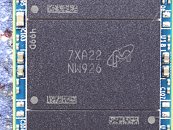- Joined
- Oct 9, 2007
- Messages
- 47,233 (7.55/day)
- Location
- Hyderabad, India
| System Name | RBMK-1000 |
|---|---|
| Processor | AMD Ryzen 7 5700G |
| Motherboard | ASUS ROG Strix B450-E Gaming |
| Cooling | DeepCool Gammax L240 V2 |
| Memory | 2x 8GB G.Skill Sniper X |
| Video Card(s) | Palit GeForce RTX 2080 SUPER GameRock |
| Storage | Western Digital Black NVMe 512GB |
| Display(s) | BenQ 1440p 60 Hz 27-inch |
| Case | Corsair Carbide 100R |
| Audio Device(s) | ASUS SupremeFX S1220A |
| Power Supply | Cooler Master MWE Gold 650W |
| Mouse | ASUS ROG Strix Impact |
| Keyboard | Gamdias Hermes E2 |
| Software | Windows 11 Pro |
Prices of NAND flash could drop to historic lows of $0.08 per gigabyte in 2019, according to Jim Handy from Objective Analysis, addressing delegates at the 2018 Flash Memory Summit. If you add the cost of the controller, optional DRAM chip, and other low-cost parts that make up an SSD, 480~512 GB drives under $70 could finally be a reality; followed by 1 TB under $120, and 2 TB under $200. Handy attributes the low prices to a catastrophic oversupply of NAND flash in the industry, which could push manufacturers to the brink of economic collapse.
The price drop is also accelerated with the introduction of the QLC (4 bits per cell) technology, which increases densities (and conversely decreases price/GB). Luckily, most NAND flash manufacturers also happen to make DRAM, and are offsetting some of their NAND flash losses with DRAM profits, as DRAM remains in undersupply. The NAND flash price-crash threatens to wipe out conventional hard-disk drives from the consumer-space, at least in matured markets; relegating them to developing markets.

View at TechPowerUp Main Site
The price drop is also accelerated with the introduction of the QLC (4 bits per cell) technology, which increases densities (and conversely decreases price/GB). Luckily, most NAND flash manufacturers also happen to make DRAM, and are offsetting some of their NAND flash losses with DRAM profits, as DRAM remains in undersupply. The NAND flash price-crash threatens to wipe out conventional hard-disk drives from the consumer-space, at least in matured markets; relegating them to developing markets.

View at TechPowerUp Main Site







